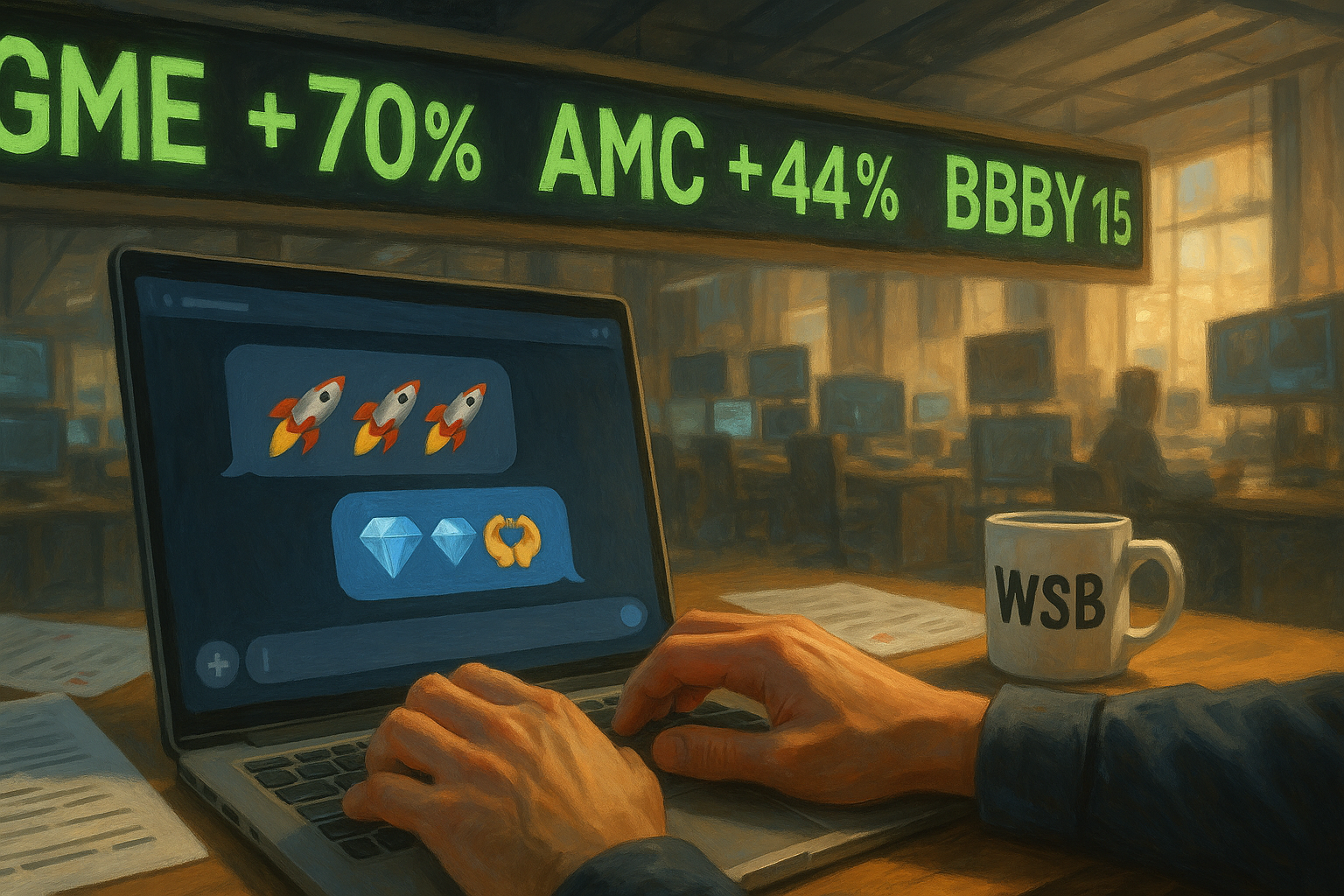The circus is back in town. Those delightfully chaotic meme stocks—the financial world's equivalent of that uncle who shows up uninvited at family gatherings and somehow leaves with everyone's wallet—have returned with a vengeance.
GameStop recently rocketed more than 70% in a single day. AMC popped 44%. Even the retail corpse formerly known as Bed Bath & Beyond (now rebranded as Beyond Inc.) jumped double digits. It's enough to make you wonder if we've all collectively time-traveled back to January 2021.
Look, I've been covering market irrationality since before the pandemic, and there's something almost comforting about the return of rocket emojis and "diamond hands" declarations. It's like watching a sequel to a movie nobody particularly asked for, but we're all secretly going to watch anyway.
What strikes me isn't just the price action itself, but the strange persistence of this whole phenomenon. Nearly three years after Keith Gill (a.k.a. Roaring Kitty) first unleashed financial chaos from his basement gaming chair, we're witnessing the same patterns play out. It's like watching evolution in real-time, if evolution occasionally went backward for the hell of it.
The New Playbook (Same as the Old Playbook, But With Memes)
Having spent countless hours in the digital trenches of Reddit's WallStreetBets forum (the things I do for journalism...), I can tell you the strategy has evolved. Slightly.
Today's retail traders are mixing their cocktail with:
- Short interest hunting (still the main ingredient)
- Options chain exploitation (they've learned some fancy tricks)
- Social media momentum building
- A microscopic dash of fundamental analysis
- And, of course, FOMO—that timeless market accelerant
The difference? Wall Street isn't getting caught with its pants down again. The big boys have built their own Reddit-sentiment-tracking algorithms. They're monitoring options flows. They're trying to surf the same waves rather than getting crushed by them.
"We're playing a different game now," one hedge fund analyst told me last week, requesting anonymity because his boss would probably fire him for even uttering the words "meme stock" without a sneer. "In 2021, we were the targets. Now we're watching the same indicators they are."
Crystal Ball Time (Warning: May Contain Shards)
Trying to predict the next meme stock target is like trying to guess which drunk person at a party will start dancing first—the indicators are there, but you're still mostly guessing.
That said, patterns emerge. Corsair Gaming (CRSR) has been gaining mentions on wallstreetbets like a snowball rolling downhill. With its relatively tight float and business model that gamers understand (mechanical keyboards! RGB lighting! The things dreams are made of!), it has potential written all over it.
Palantir (PLTR)—ah, Palantir. I've never seen a company inspire such devotion among people who can't actually explain what it does. "Big data," they say confidently, before changing the subject. After some decent earnings, it could find itself back in the meme spotlight.
Then there's Upstart Holdings (UPST). It combines three magic ingredients: AI hype, a beaten-down stock price, and short interest. That's practically the recipe for a Reddit soufflé.
I spoke with several retail traders who mentioned Affirm Holdings (AFRM) and Chinese EV maker Nio (NIO) as potential candidates, too. The common thread? They're all volatile, somewhat controversial, and have a story that can be compressed into a compelling Reddit post—preferably one featuring SpongeBob memes.
The Part Where I Feel Morally Obligated to Be a Buzzkill
Remember how your mom used to tell you not to jump off things just because your friends were doing it? That advice applies here.
Most people who chase meme stocks end up like Wile E. Coyote—running in midair for a moment before the inevitable plunge. For every screenshot of a 1,000% gain that makes it to the top of Reddit, there are hundreds of devastated accounts that nobody posts about.
It's financial musical chairs, and I've interviewed too many people who were standing when the music stopped. One Gen Z trader put it to me bluntly: "I made $22,000 on GameStop in a day... and then lost $30,000 the next week. I drive for DoorDash now."
The Bigger Picture (Or: Why Economists Are Pulling Their Hair Out)
What fascinates me about these movements isn't just the price action—it's what they reveal about how investing has changed.
The gatekeepers are gone. Information asymmetry has shrunk. And perhaps most importantly, an entire generation of investors has been conditioned to see every market drop as a buying opportunity.
When you've watched Bitcoin crash 80% multiple times only to reach new highs, or seen the entire market crater during COVID only to soar months later, you develop a different relationship with risk. The market has inadvertently trained a generation of investors to "buy the dip"—sometimes regardless of what that dip represents.
I remember interviewing a behavioral economist in 2022 who compared it to operant conditioning. "We've created a generation of investors who've been rewarded for ignoring traditional risk signals," he told me. "That's going to end badly for many of them, but we don't know when."
In the end, meme stocks aren't just about GameStop or AMC—they're about a fundamental shift in how retail investors approach risk, coordination, and market participation.
Whether this represents the democratization of finance or just a new form of gambling depends largely on your perspective and, frankly, your current P&L statement.
As a grizzled market reporter once told me over whiskeys (too many) after the 2008 crash: "The market always finds a way to humble us all. The only question is whether you're laughing or crying when your number comes up."
I suspect for meme stock chasers, it'll be a bit of both.
